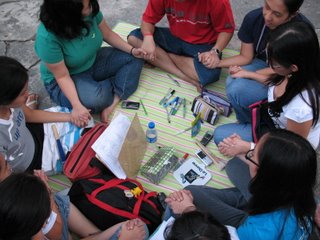
30 November 2006:
Matthew 4, 18-22: The Call of the Fishermen
The feast today provides a respite from the apocalyptic literature following the last week of the liturgical year. The gospel does not speak of fire and brimstone, but of gentleness. It does not speak of the desolation of
Matthew’s gospel introduces the disciples who will form Jesus’ inner circle. Today we focus our attention to Andrew, Peter’s brother. First, Andrew like the others was simple and ordinary. They were not learned nor taught under the mentorship of a rabbi. Second, Andrew was at sea, fishing like the hundreds of fishermen plying
We take the cue from here. We are indeed learned. We are products of good schools and we have undergone the rigors of application and training in top universities or companies. Intellectual arrogance can be our downfall. The political climate today calls us to learn from the ordinary folks to whom we pledge our service.
Second, we are in a crisis. We must be ready to drop our nets anytime we are called to action. The world does not revolve on our world and our schedules. I guess this is where many student leaders or organizations meet their challenge. In a call to be flexible, they become rigid owing their allegiance to tradition and history (they have been singing for years at this definite time and date; since time immemorial they have been the pillars of this parish) and forget that the dynamism and life of an organization lies not in their history, but in their ability to respond to present situations and present crisis. Not the past crisis. Not the past challenge. To respond to the call of the Lord at this point in our lives. Furthermore, in the present call to unity --- to synergize and develop the ability to work together--- we find ourselves more concerned about ourselves. If there is a personal selfishness, there is an organizational selfishness. We forget that love means cooperation. We forget that Jesus called people to mission: to go out to the world and tell the good news. To bring people together is precisely the gift of the Holy Spirit. If an persons and people and organizations claim that the Holy Spirit is with them, there is a way to know whether it is true: do they bring people together--- again not in an exclusive way? The Church was born at Pentecost, because people were brought together in the love of the Lord and one another. We cannot determine other people’s lives. Instead, our life must be determined by our ministry and the people we serve. And our response must be quick and urgent.
A final word: in the Gospel of John, Andrew was the one who brought Peter to Jesus. He said, “We have found the Messiah, the Christ.” May our lives show that we indeed found the Messiah, and allow people to see Christ living in their midst.

No comments:
Post a Comment